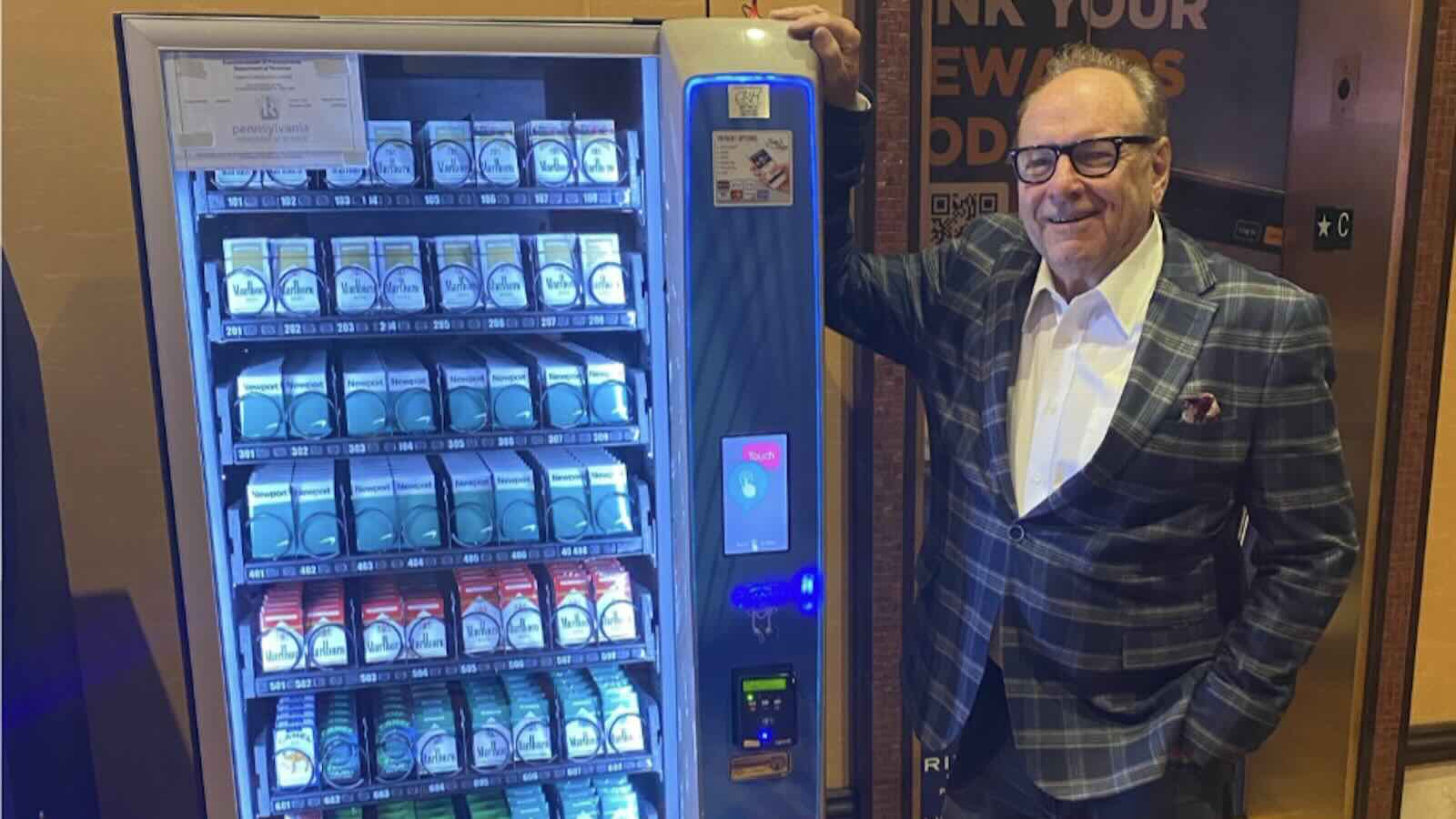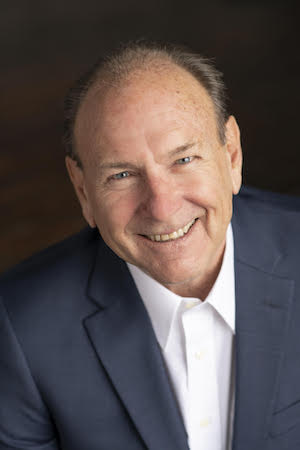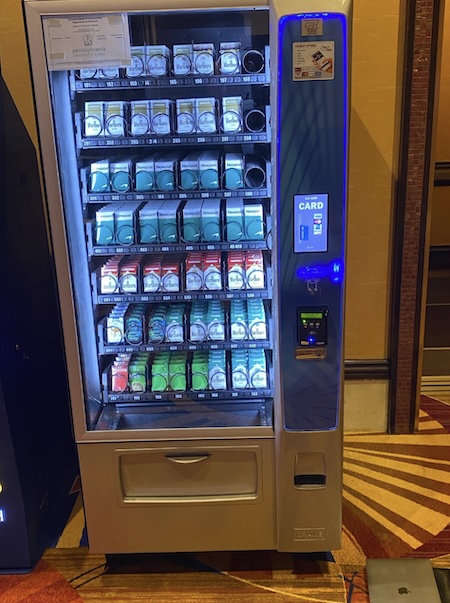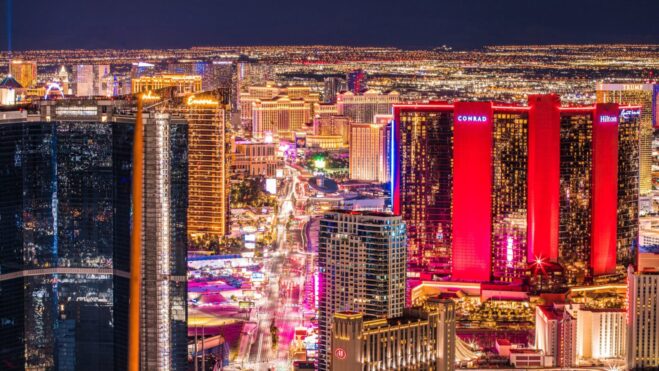Schuetz: Cigarette Machine On Premises Reveals What Casinos Are Really Protecting
"Now, many of you have suggested that I am a bit harsh on the casinos and I should work harder to isolate the good. In that spirit, I would applaud them for not using child labor in their production processes."
4 min

I recently attended the National Council of Legislators from Gaming States (NCLGS) 2024 Summer Meeting in Pittsburgh, Pennsylvania. I had been invited to speak on a panel with sports betting legends Billy Walters and Spanky (Gadoon Kyrollos).
I stayed at the Landing Hotel, which is attached to the Rivers Casino property. As is my habit, I awoke at 5:00 a.m. one morning, and since I was up and didn’t want to annoy my partner, I thought I would walk about the casino. While touring the casino, I was fascinated to come across an operating cigarette machine.
It was like a retro moment—not unlike if I had looked up to see the Marlboro Man on his horse in the casino with a lung dart hanging from his lips. Holy hell, I am in Eastern Pennsylvania and am in a time warp.

It is 2024, and the damage that cigarettes have inflicted on humans is well documented – and has been so for a long time. Civilized societies have long disallowed smoking in public areas for the simple reason that smoking kills people – both the smoker and those around the smoker. To believe otherwise is comparable to still believing in trepanning, where, in ancient times, holes were drilled in the skull to relieve the individual of evil spirits.
And yet this casino is screaming – come on down, have a drink, play a little blackjack…and destroy the health of yourself, our other customers, and our employees. We don’t care, for there is money in it.
I can’t remember the last time I saw a public building with a cigarette machine in it. I was also interested that this machine had nothing approaching a warning sign, even though the product sold by that machine had killed and damaged the health of millions.
Keep your head on a swivel
One does wonder, since Pennsylvania is an “open carry” state (except Philadelphia), if we can soon anticipate assault weapons being sold by machines in the casino, also without any warning labels. This just might help discipline that fool on third base of a blackjack game from continually taking the dealer’s break card. Sure, some folks might be damaged by selling assault weapons in casinos, but the taxes on sales might help fund some important Pennsylvania government projects.
One should also note in the picture the presence of “flavored” cigarette brands. Flavored brands are considered more addictive, harder to quit, more damaging to the health of the user, and often targeted towards people of color. See here, here, and here.

During the NCLGS conference, several officials from the Commonwealth of Pennsylvania, all of whom work in smokeless offices, spoke at one of the early panels. I suspect this was an honor granted to the conference’s host state. I wanted to ask them if they would be kind enough to go down to the casino floor with me to be photographed by the cigarette machine since many of them are apparently cool with it, but I decided this would be a level of obnoxiousness that even I would not stoop to.
I would love to see the American Gaming Association use this casino cigarette machine photo on their website when they explain what gaming is all about in the United States. The AGA clearly understands that most problem gamblers smoke (see here, here, and here). Because of this, catering to problem gamblers really adds to the casino’s bottom line. If smoking is banned, it will adversely impact the problem gambling market for casinos—and the problem gambling market is an important market for many casinos. As I have often observed, because the majority of problem gamblers smoke, having a policy that allows smoking in a casino is like putting out the welcome mat for the problem gambler.
The smoking market is also an important market for the American Gaming Association, for, after all, it is an organization that receives funding to say good things about the industry and ignore some of its ugly realities. The accounts receivable department of the American Gaming Association shapes that association’s moral code.
Smoke free for me, not for thee
In March every year, the American Gaming Association celebrates Problem Gambling Month from their non-smoking offices. Maybe they could have April be “It’s Time to Fire up a Lung-dart Month” to celebrate the importance of smoking to casino profitability. Then, May could be “Attend a Funeral for a Casino Employee Month” as a tribute to so many whose health has suffered as a result of the industry’s need to maintain a positive and supportive environment to secure the patronage of problem gamblers.
Now, many of you have suggested that I am a bit harsh on the casinos and I should work harder to isolate the good. In that spirit, I would applaud them for not using child labor in their production processes. The casinos have primarily stopped beating customers in the back room for cheating and card counting. Also, when casino executives attend government hearings, they no longer cover their faces with their hats as they pass the press on the way to the hearings.
I started in the casino business in 1971, and I have often suggested that my career has transcended an important part of the history of the U.S. casino industry, which went from being controlled by organized crime to being controlled by unorganized crime. From a moral standpoint, allowing smoking in casinos, knowing the unquestionable reality that it is damaging to people’s health, is a crime against humanity. But until the powers in the casino industry realize, while working in their smoke-free offices, that it is not right to trade people’s health for profits, nothing will change. And their loyal, well-paid lobbyists will continue to ignore the reality that many casinos in the U.S. are full of dangerous and toxic air.
On your next visit to a Pennsylvania casino, be sure to say hi to the Marlboro Man.
Richard Schuetz entered the gaming industry working nights as a blackjack and dice dealer while attending college and has since served in many capacities within the industry, including operations, finance, and marketing. He has held senior executive positions up to and including CEO in jurisdictions across the United States, including the gaming markets of Las Vegas, Atlantic City, Reno/Tahoe, Laughlin, Minnesota, Mississippi, and Louisiana. In addition, he has consulted and taught around the globe and served as a member of the California Gambling Control Commission and Executive Director of the Bermuda Casino Gaming Commission. He also publishes extensively on gaming, gaming regulation, diversity, and gaming history.






